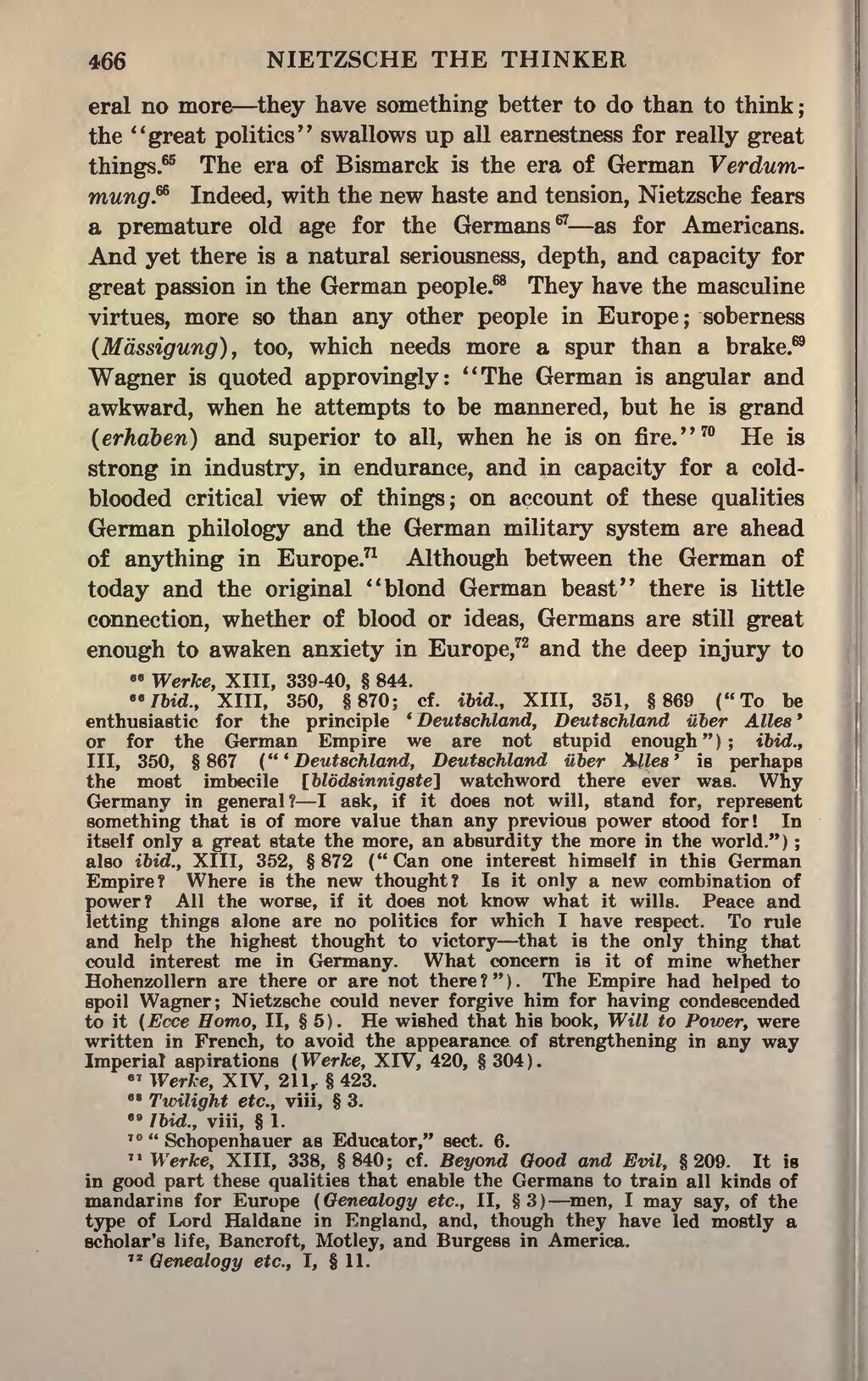eral no more—they have something better to do than to think; the "great politics" swallows up all earnestness for really great things.[1] The era of Bismarck is the era of German Verdummung.[2] Indeed, with the new haste and tension, Nietzsche fears a premature old age for the Germans[3]—as for Americans. And yet there is a natural seriousness, depth, and capacity for great passion in the German people.[4] They have the masculine virtues, more so than any other people in Europe; soberness (Mässigung), too, which needs more a spur than a brake.[5] Wagner is quoted approvingly: "The German is angular and awkward, when he attempts to be mannered, but he is grand (erhaben) and superior to all, when he is on fire."[6] He is strong in industry, in endurance, and in capacity for a cold-blooded critical view of things; on account of these qualities German philology and the German military system are ahead of anything in Europe.[7] Although between the German of today and the original "blond German beast" there is little connection, whether of blood or ideas, Germans are still great enough to awaken anxiety in Europe,[8] and the deep injury to
- ↑ Werke, XIII, 339-40, § 844.
- ↑ Ibid., XIII, 350, § 870; cf. ibid., XIII, 351, § 869 ("To be enthusiastic for the principle 'Deutschland, Deutschland über Alles' or for the German Empire we are not stupid enough"); ibid., III, 350, § 867 ("'Deutschland, Deutschland über Alles' is perhaps the most imbecile [blödsinnigate] watchword there ever was. Why Germany in general?—I ask, if it does not will, stand for, represent something that is of more value than any previous power stood for! In itself only a great state the more, an absurdity the more in the world."); also ibid., XIII, 352, § 872 ("Can one interest himself in this German Empire? Where is the new thought? Is it only a new combination of power? All the worse, if it does not know what it wills. Peace and letting things alone are no politics for which I have respect. To rule and help the highest thought to victory—that is the only thing that could interest me in Germany. What concern is it of mine whether Hohenzollern are there or are not there?"). The Empire had helped to spoil Wagner; Nietzsche could never forgive him for having condescended to it (Ecce Homo, II, § 5). He wished that his book, Will to Power, were written in French, to avoid the appearance of strengthening in any way Imperial aspirations (Werke, XIV, 420, § 304).
- ↑ Werke, XIV, 211,. § 423.
- ↑ Twilight etc., viii, § 3.
- ↑ Ibid., viii, § 1.
- ↑ "Schopenhauer as Educator," sect. 6.
- ↑ Werke, XIII, 338, § 840; cf. Beyond Good and Evil, § 209. It is in good part these qualities that enable the Germans to train all kinds of mandarins for Europe (Genealogy etc., II, § 3)—men, I may say, of the type of Lord Haldane in England, and, though they have led mostly a scholar's life, Bancroft, Motley, and Burgess in America.
- ↑ Genealogy etc., I, § 11.
